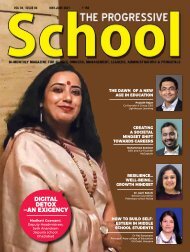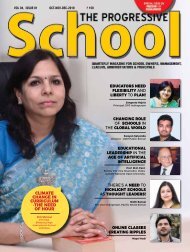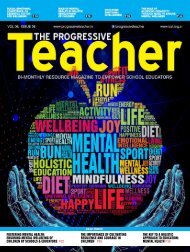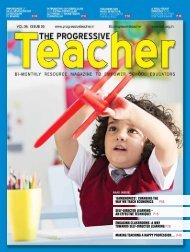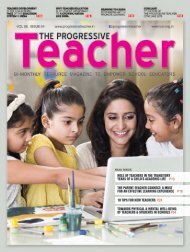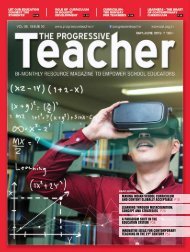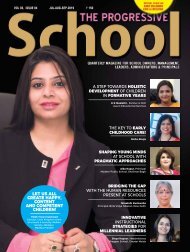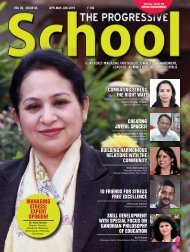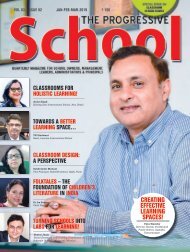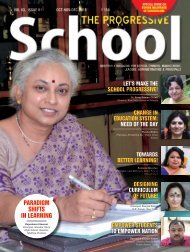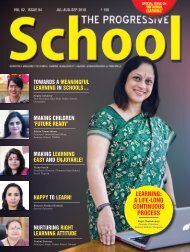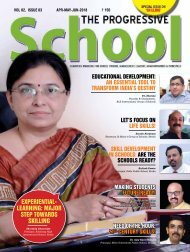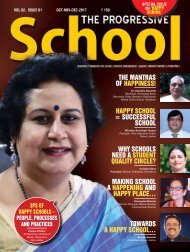The Progressive Teacher Vol 03 Issue 05
This issue of The Progressive Teacher focuses on "Teaching of Social Studies". The magazine provides guidance to the teachers by their peers and school leaders for tackling challenges with innovative ideas.
This issue of The Progressive Teacher focuses on "Teaching of Social Studies". The magazine provides guidance to the teachers by their peers and school leaders for tackling challenges with innovative ideas.
Create successful ePaper yourself
Turn your PDF publications into a flip-book with our unique Google optimized e-Paper software.
case study<br />
Are our teachers equipped for the<br />
present and ready for the future?<br />
<strong>The</strong> need for teacher education and addressing shortage of teachers<br />
Recognising the important role the teacher plays in the<br />
delivery of education, it is important to look at the challenges<br />
facing the country in ensuring that all children have qualified<br />
teachers in their classrooms.<br />
Currently India faces an acute shortage<br />
of teachers. To achieve the sustainable<br />
development goals for education:<br />
‘ensuring every child has access to a quality<br />
education by 2<strong>03</strong>0’, UNESCO has projected<br />
that India will need to recruit 30 lakh additional<br />
teachers. This gap in school vis-à-vis teachers<br />
also finds reflection in the recent District<br />
Information System for Education (DISE).<br />
figures shared by the Union Ministry of Human Resource Development.<br />
providing continuous professional<br />
development opportunities and transfers.<br />
<strong>The</strong> Ministry of Human Resource<br />
Development had invited recommendations<br />
to the Draft National Education Policy 2016<br />
(NEP). This presented an opportune moment<br />
for the government to examine the issues<br />
relating to teachers and redesign <strong>Teacher</strong><br />
education programmes.<br />
In the academic year 2014-15 (Source: District Information System for Education,<br />
Union Ministry of Human Resource Development)<br />
Schools in India<br />
Total number<br />
of schools<br />
Two teacher<br />
(%)<br />
One teacher<br />
(%)<br />
No teacher<br />
All (primary, senior<br />
(%) (numbers)<br />
secondary and<br />
12.6 lakh 41.55 11.62<br />
higher secondary<br />
0.84 11249<br />
sections)<br />
Primary Schools 7.6 lakh 28.68 8.84 0.91 6404<br />
Recent reports suggest that there are<br />
approximately 6.6 lakh teachers currently<br />
in the system who lack the requisite<br />
qualifications; in the Union education budget<br />
in 2016-17, a mere 1.17 per cent of the total<br />
is allocated to teacher education and training.<br />
At a recent conference, the Secretary of<br />
Education rightly stated that availability<br />
and quality of teachers is the key factor<br />
for ensuring learning. Given that teachers<br />
are critical, there is an urgent need for<br />
pre-service teacher education, recruitment,<br />
No education system in the world has<br />
excelled without making a significant<br />
investment in building a cadre of quality<br />
teachers. Yet teacher education is one of<br />
the weakest links in the education sector<br />
in India. Against this backdrop, Tata Trusts<br />
have relentlessly focused on addressing some<br />
of the critical needs in education in India,<br />
especially with regard to teachers. With years<br />
of experience in working to improve access to<br />
quality education in some of the most remote<br />
geographies of India, while simultaneously<br />
addressing concerns of equity, through<br />
enhanced learning levels and opportunities,<br />
Tata Trusts has been ensuring appropriate<br />
learning levels, strengthening systems,<br />
training teachers, integrating appropriate<br />
technologies and mobilising communities.<br />
It has set up a core committee comprising<br />
well-known educationists to put forward a<br />
strategy on how teacher education should be<br />
addressed.<br />
Listed below are some of the<br />
recommendations made by the<br />
Tata Trusts:<br />
• Focus on teacher education programme<br />
– restructuring of teacher education<br />
programmes, linking them to universities<br />
and schools. Create centres of excellence<br />
for <strong>Teacher</strong> Education.<br />
• Establish clear criteria for recruitment of<br />
students into teacher education.<br />
• Equip teachers with essential knowledge<br />
base and multiplicity of skills ranging<br />
from subject competence, understanding<br />
of the student, continuous assessment and<br />
instilling values and behaviours.<br />
• Increase motivation of teachers and equip<br />
them with skills by mobility within the<br />
system.<br />
• Use technology to tackle the problem of<br />
teacher absenteeism, and reward good<br />
performance.<br />
• Rein in substandard and unregulated<br />
teacher training institutes, 90 % of which<br />
are in the private sector.<br />
• Strengthen state-run institutes that suffer<br />
from multiple deficiencies, by a new<br />
institutional framework to formalize the<br />
accreditation process, develop institutional<br />
mechanisms for periodic monitoring of<br />
teacher training institutes and to ensure<br />
strict adherence to quality parameters<br />
• Help teachers identify their own<br />
professional development at least once<br />
every five years.<br />
• Encourage teaching as a professional<br />
career option for the brightest; higher<br />
education should diversify specializations<br />
into areas of curriculum and pedagogical<br />
studies.<br />
• Fill in the teacher vacancies and create<br />
state-specific norms for fair and equitable<br />
deployment of teachers.<br />
(Tata Trusts are amongst India’s oldest,<br />
non-sectarian philanthropic organizations<br />
that work in several areas of community<br />
development. Tata Trusts seek to be catalysts<br />
in development through partnerships and<br />
direct implementation in the areas of Natural<br />
Resources Management, Rural Livelihoods,<br />
Urban Livelihoods & Poverty, Education,<br />
Enhancing Civil Society and Governance,<br />
Health and Arts, Crafts and Culture.)<br />
58 <strong>The</strong> <strong>Progressive</strong> <strong>Teacher</strong> Nov/Dec 2016




